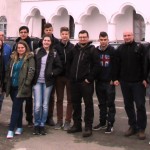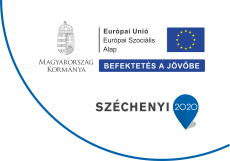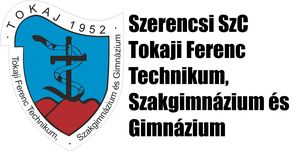 A TFG-ből 8 diák és 4 tanár vágott neki a majdnem ezer kilométeres útnak a romániai Macinba április vége felé. Két nap alatt sikerült megtennünk a Kárpátokon át vezető utat a Duna-parti kisvárosba, mely kb. 100 kilométerre fekszik a Fekete-tengertől.
A TFG-ből 8 diák és 4 tanár vágott neki a majdnem ezer kilométeres útnak a romániai Macinba április vége felé. Két nap alatt sikerült megtennünk a Kárpátokon át vezető utat a Duna-parti kisvárosba, mely kb. 100 kilométerre fekszik a Fekete-tengertől.
Diákjaink házigazda családoknál kaptak elhelyezést portugál diákokkal együtt, a négy vendég nemzet – bulgár, magyar, portugál, török – tanárai pedig egy kényelmes szállodában lakhattak.
Öt nemzet – öt iskola diákjai és tanárai találkoztak a Comenius projekt keretében, hogy környezeti problémákról és lehetséges megoldásukról tartsanak megbeszélést.
Hétfőn reggel a helyi művelődési házban volt a projekt hivatalos megnyitó ünnepsége, ahol a házigazdák színes kulturális műsorral köszöntöttek minket, majd személyesen üdvözöltek minden vendég diákot és tanárt. Délután minden nemzet bemutatta néptánc és népdal programját – nagy sikerrel – az étkezéseink helyszínéül szolgáló étteremben. A szakmai munka kedden kezdődött. Az önkormányzat előadótermében hallgathattunk meg a környezeti problémák történeti hátterével és az emberi tevékenység által okozott környezeti károkkal és ezek lehetséges megoldásával kapcsolatos előadásokat – angol nyelven. Az előadások után tesztet töltöttünk ki és csoportmunkában problémamegoldó tevékenységben vettünk részt – az előadásokkal kapcsolatban. A résztvevő diákok egy közös újságot szerkesztettek, melyben mindegyik nemzet beszámolt az őket sújtó legjellemzőbb természeti katasztrófákról, melyek a környezeti változások számlájára írhatók, valamint környezettel kapcsolatos nemzeti legendákat gyűjtöttünk és angol – nemzeti nyelvű szótárat készítettünk az országainkra legjellemzőbb környezetvédelmi szakkifejezésekből. Alkalmunk volt meglátogatni egy sziklás környezetvédelmi területet Macin közelében, ahol néhány órás hegymászásra is sor került. A közeli Tulcsában meglátogattuk a Duna-delta növény- és állatvilágáról, valamint a delta településtörténetéről szóló kiállítást. A tanárokat fogadta a területi oktatási biztos is.
Mivel a projekt céljai között szerepel a különböző nemzetek, kultúrájának megismerése, ezek tisztelete, tolerálása is, vendéglátóink elvittek minket egy férfi és egy női ortodox kolostorba, ahol megismerkedhettünk az ortodox keresztény vallással és művészettel.
Természetesen végig a projekt folyamán a munkanyelv az angol volt. Diákjaink ezen a területen is jól megállták helyüket. Amikor a helyi programokon nem angol nyelven kaptunk tájékoztatást, a helyi iskola néhány diákja volt a program tolmácsa.
Az ellátás mindig finom és bőséges volt, az iskolai programokon mindig házi süteményeket kaptunk.
Tanulóink sok élménnyel gazdagodtak a mindig udvarias és figyelmes vendéglátó családoknál eltöltött majdnem egy hét alatt.
Összességében kellemes, hasznos és változatos programban volt részünk, melyet gyakran hűvös és szeles időjárás kísért.
Derecskei Sándor
projekt koordinátor
COMENIUS EVENT IN MACIN
It was eight Hungarian students and four teachers who set off the long – nearly 1000km – journey to Macin, Romania. It took two days to get there as we needed a night break. We arrived at our destination late evening on Sunday. Macin is a nice, little town on the Danube bank 100km from the Black Sea. Our students were accommodated at Romanian host families together with Portuguese students. All the teachers of the four participant-nations – Bulgarians, Hungarians, Portuguese and Turkish – were booked into a small, comfortable hotel. The students and teachers of the five nations met in Macin to discuss environmental problems and their possible solutions.
The opening ceremony of the event was held in the local leisure centre where our host students entertained us with national folk programme and greeted each foreign student and teacher by person. On the same evening, each country presented its cultural programme – with great success.
The professional part of the project started on Tuesday and contained various activities such as lectures on the historic background of the environmental changes, the environmental problems caused by human activities and possible solutions. A lecture based test also was to be answered. We also carried out an activity of identifying and getting aware of environmental changes and possible solutions in team work. The students created a single issue of a journal concerning the natural disasters our nations had to cope with in the previous years. The issue also incorporated environment-related legends of the five nations and lists of expressions of characteristic vocabulary. We also had a chance to visit a nearby environmental protection area in the Macin mountains – a rocky scene – and do rock climbing. A visit to the nearby city of Tulcea was also part of our professional programme, where we took a guided walk in the local museum dedicated to the natural and social features of the old Danube river. We could see there how rich the flora and fauna of the Danube delta is and how long it was inhabited by different tribes and nations. The teachers were invited by the head of the educational district in his office where he greeted us. One of the aims of the Comenius projects is to get the participants aware of how diverse yet closely related their cultures and richly interwoven with commonly shared traditions and so tolerance must be a natural phenomenon among us. That is why we were taken to a male and a female monastery to get acquainted with the orthodox Christian religion and art.
Of course the language of communication was English throughout the event and where the locals could not share it in the course of the event some host students took the lion’s share in translation.
Our students enjoyed staying at their student-counterparts and could get a lot of experience. We all enjoyed the polite, attentive attitude of our hosts and the always abundant catering.

